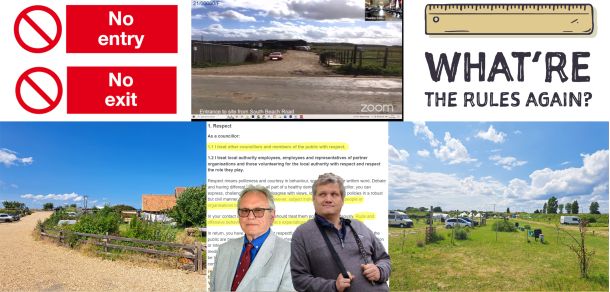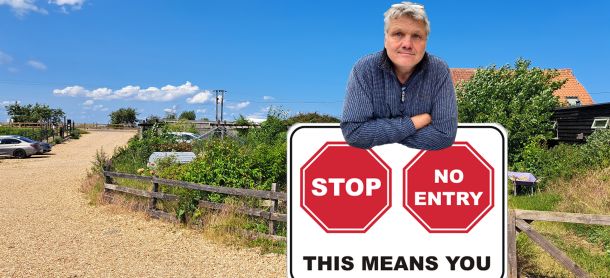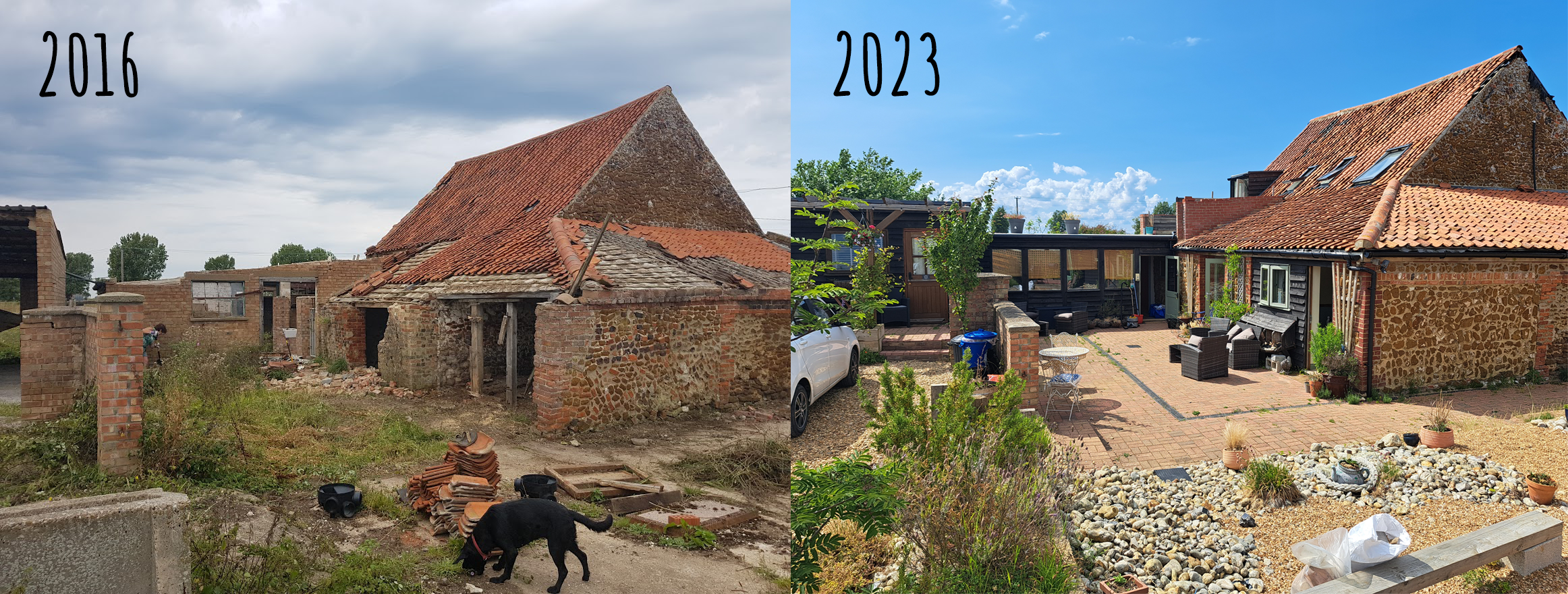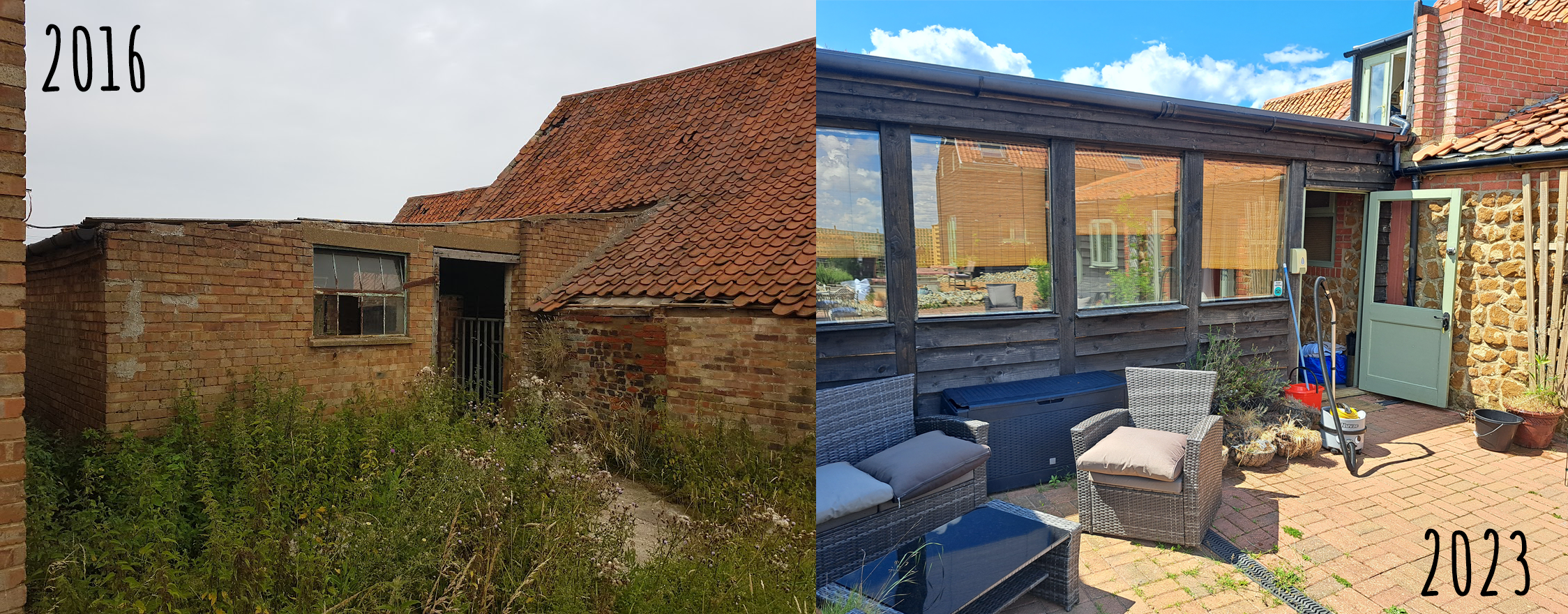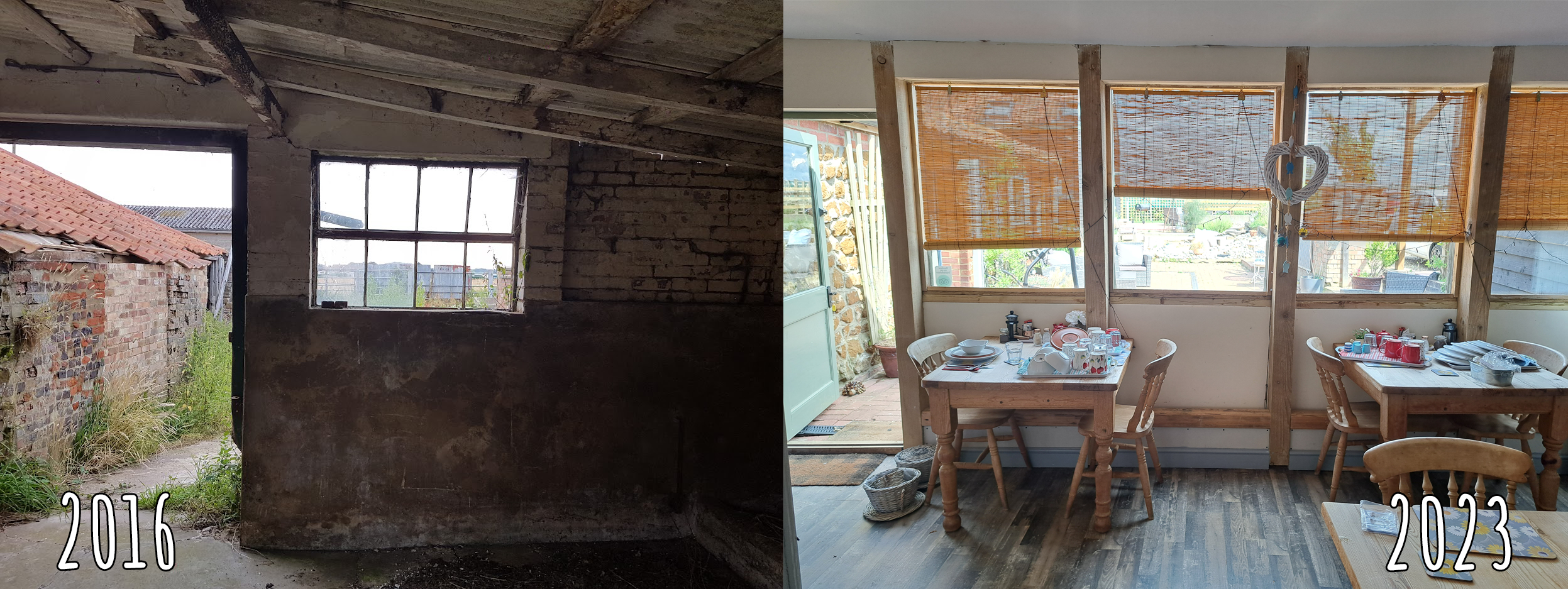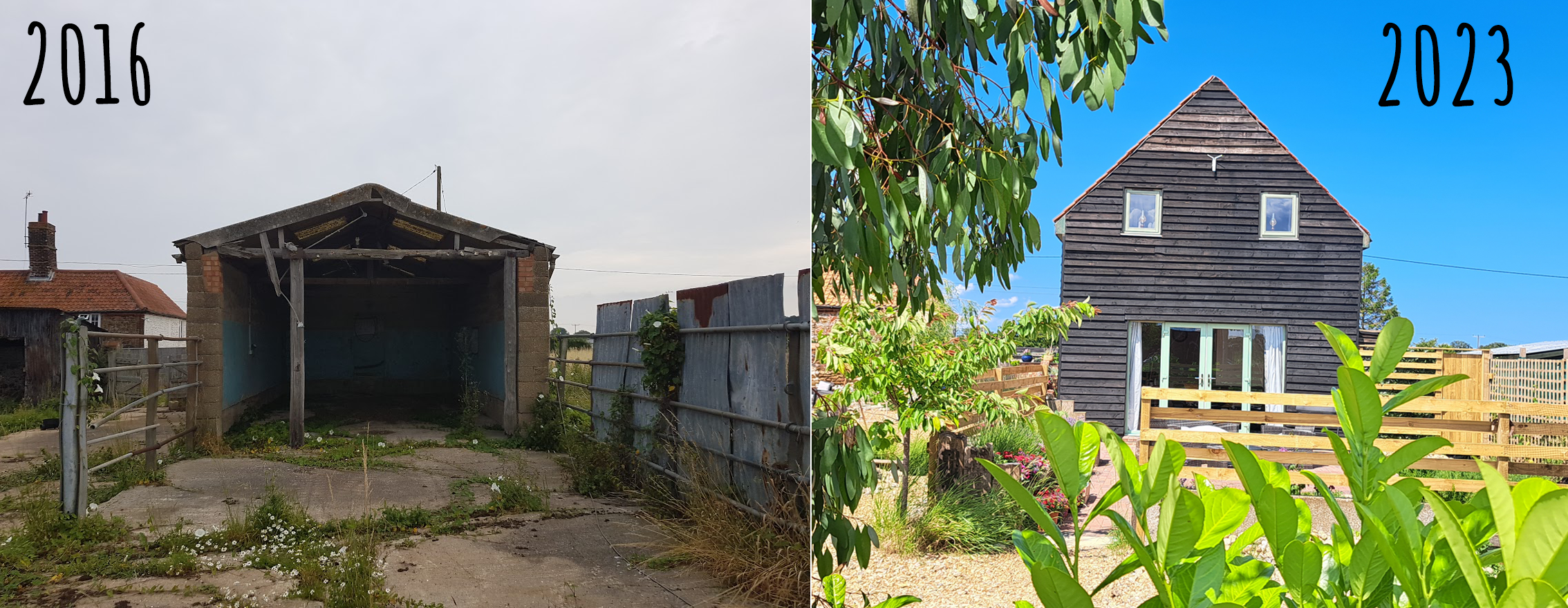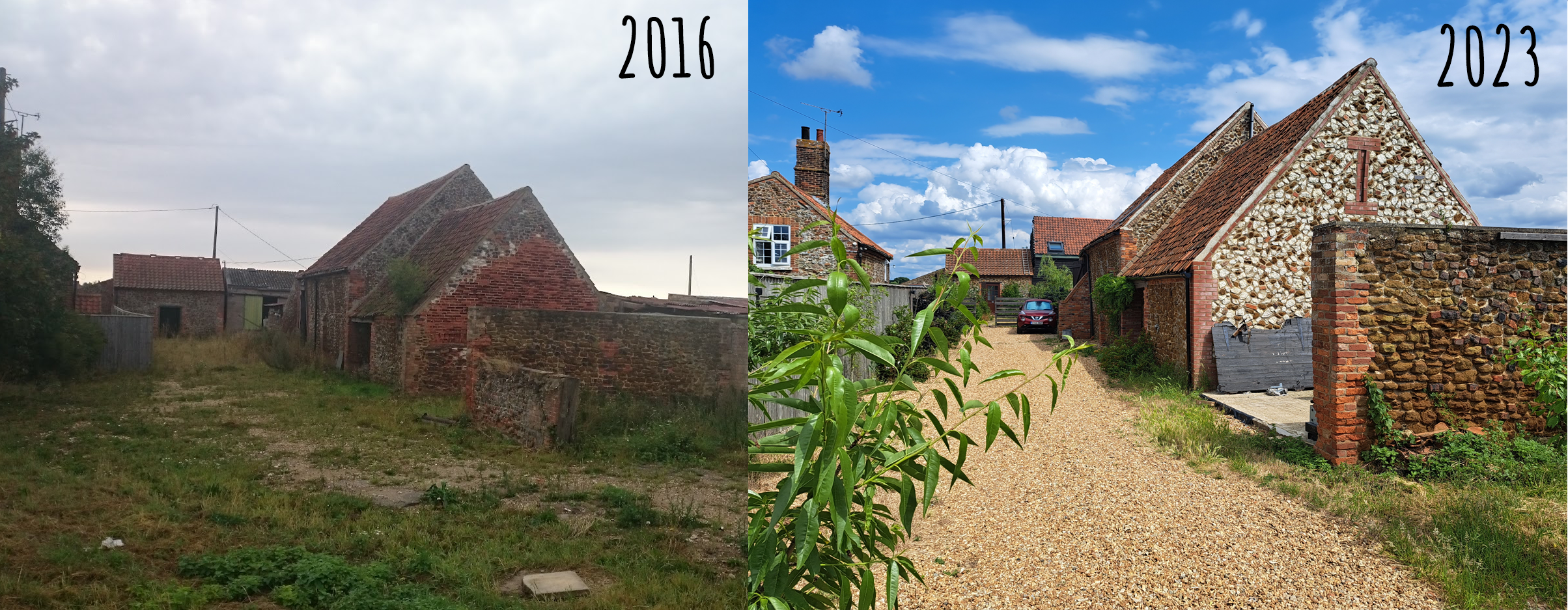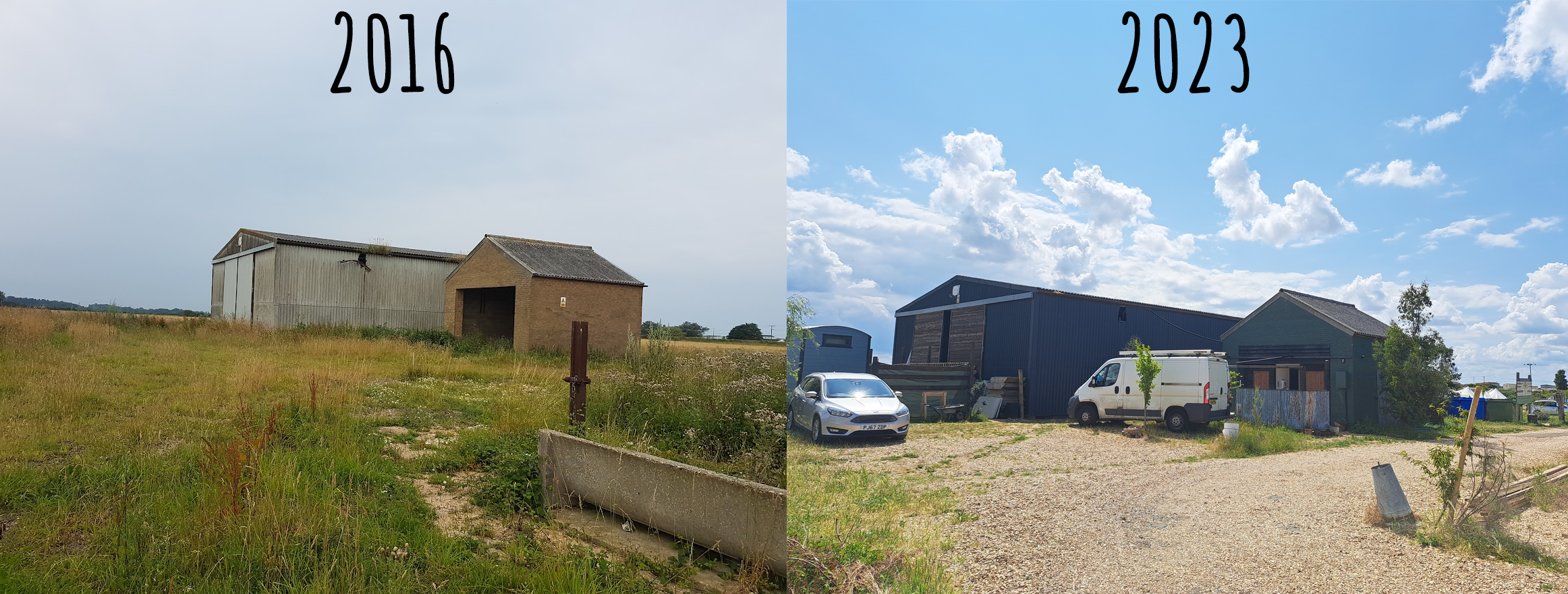Daily Battles with the Council
The legal cost of running a tourist venue
Hello all, Nigel Marsh here, owner of mYminibreak and manager/warden of Hunstanton Camping & Glamping, Norfolk Coastal Cottages, and Norfolk Accommodation.
As I'm sure many in the leisure industry may know, running a public event or public facility can be troublesome, trying, and frustrating. Among the long laundry list of things to go through, there are ecology reports, commercial electric wiring conditions, safety reports, planning applications, planning refusals, planning appeals, planning enforcements, seeking planning advice from consultants, planning enforcement consultants advice, magistrates hearings, alleged criminal proceedings, environmental impacts, habitats regulation assessments, and much, much more. However, no process or bit of work has been so tedious, temperamental, and utterly weighted against reason as the various legal battles I've had to suffer through with the authorities.

Whoever thought that running a quiet campsite would be so stressful?
Since 2018, I've been engaged in three separate legal disputes with the local authorities and in each battle, I've had to put up with high legal costs, delayed decisions, and flimsy excuses that the council has scrounged up to hinder progress at every step. Time and time again I have proven that my planned developments are lawful, and time and time again the council has returned with the most minor nitpick which, more often than not, does not even break the law. It almost feels like there is a rogue planning officer or some higher-up figurehead pulling the strings who I have taken to calling The Muppet Master!
These three legal disputes regard the Hunstanton Camping & Glamping site, the Grainstore on that site, entry to the site, and two other sites in Holme-next-the-Sea and Burnham Market. In each one of these separate cases, it feels like I have been forced to appeal due to The Muppet Master instructing planning officers to find facts to fit their desired results, rather than the lawful and correct process of analysing facts to then decide on the result.
Backstory of me and the site
Back in 2016 an old, dilapidated farm went into auction to be sold off to the highest bidder. As a fan of both challenges and providing for people and local communities, I saw the farm as an opportunity and (without the prior knowledge or blessing of my wife) went to bid on a property I couldn't really afford.
I was surprised, then, that I won the bid with a £10,000 deposit.
Thus began my ownership of Beach Farm on 72 South Beach Road: a run-down site with a field and a handful of agricultural buildings, including a Grainstore, an Old Barn, and a cow shed - all dilapidated and nigh-unusable, of course.
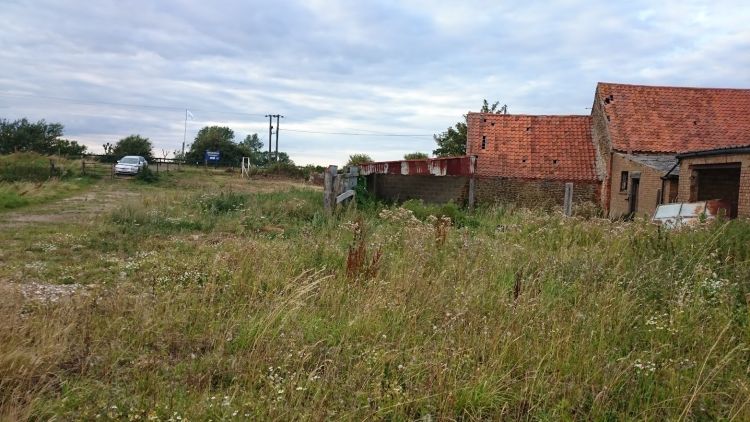
Site Entrance
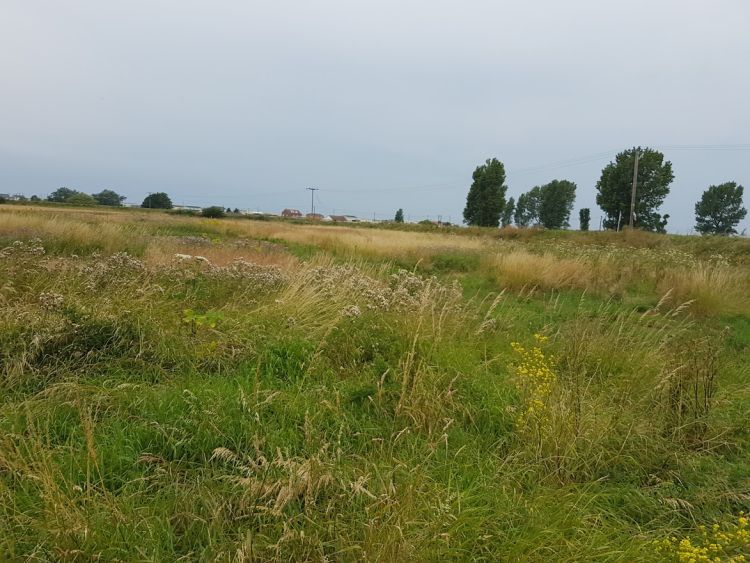
Campsite Field
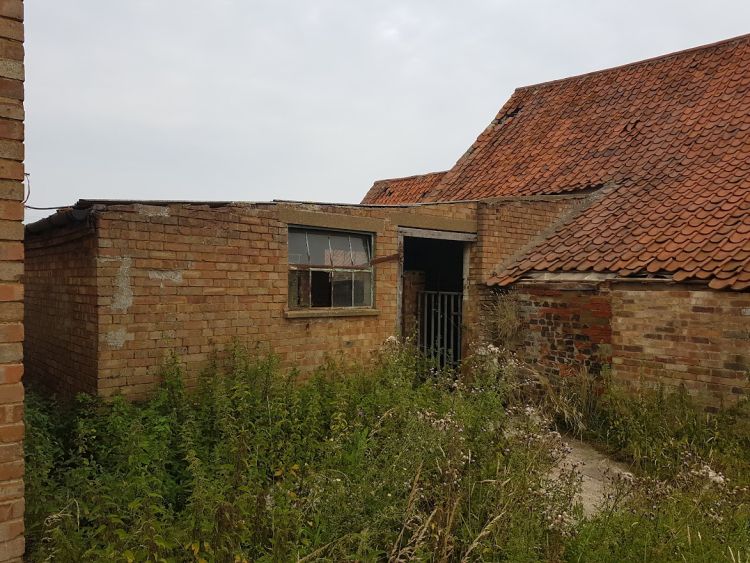
Breakfast Room
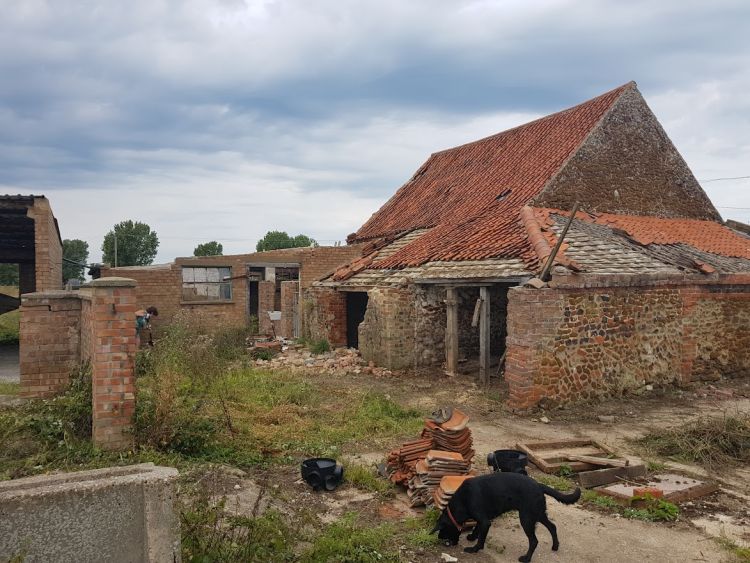
The Old Barn and Breakfast Room
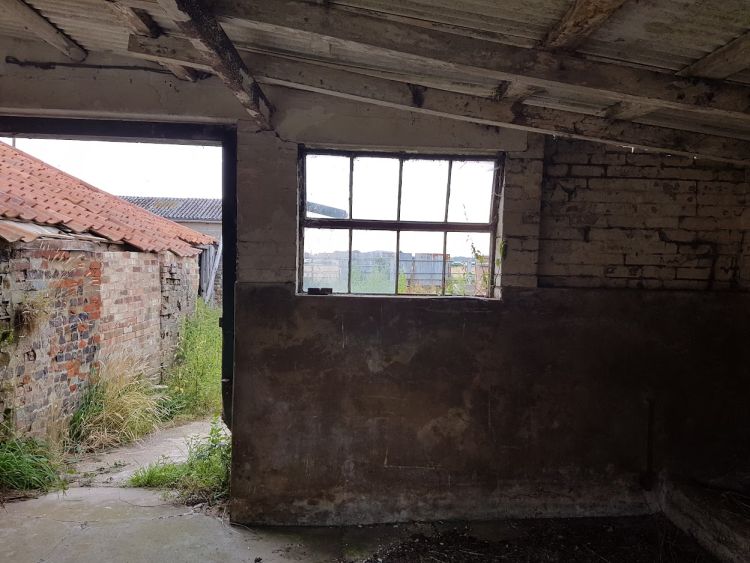
Breakfast Room Interior
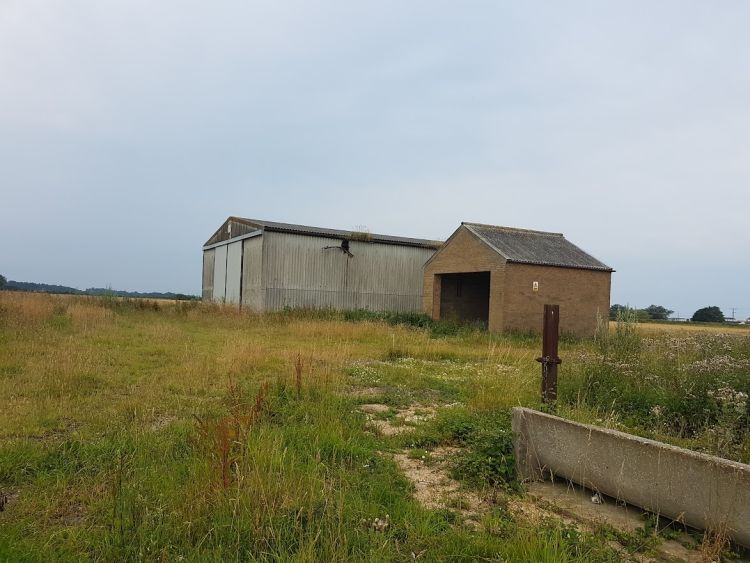
Grainstore and Toilet Block
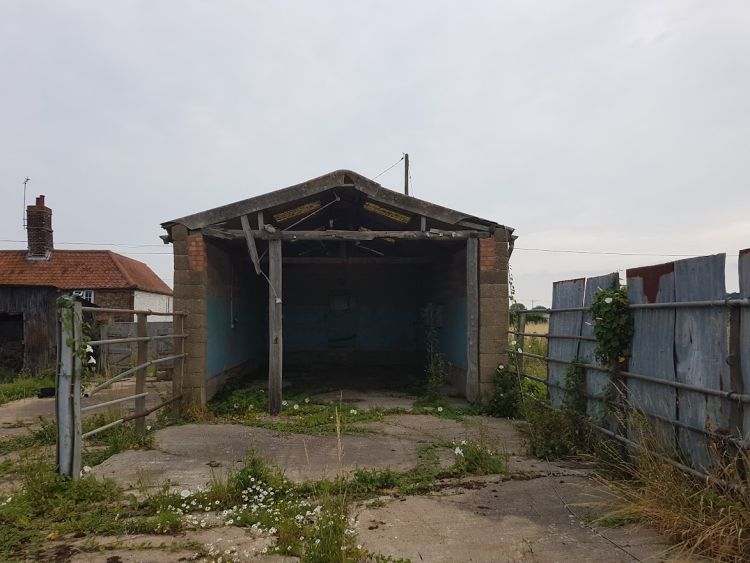
The Dairy
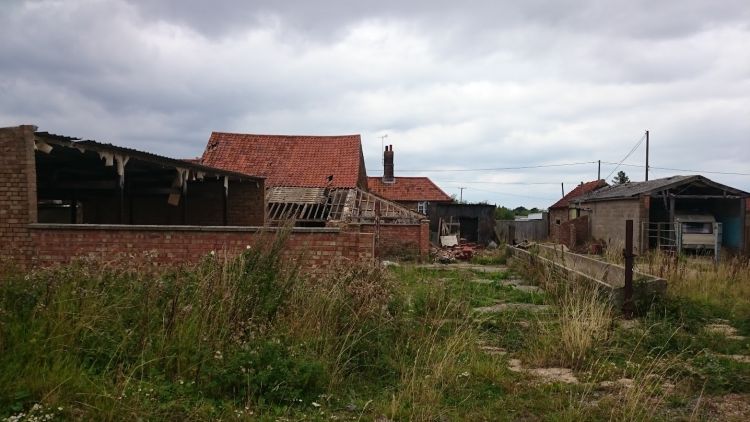
The Old Barn and The Dairy
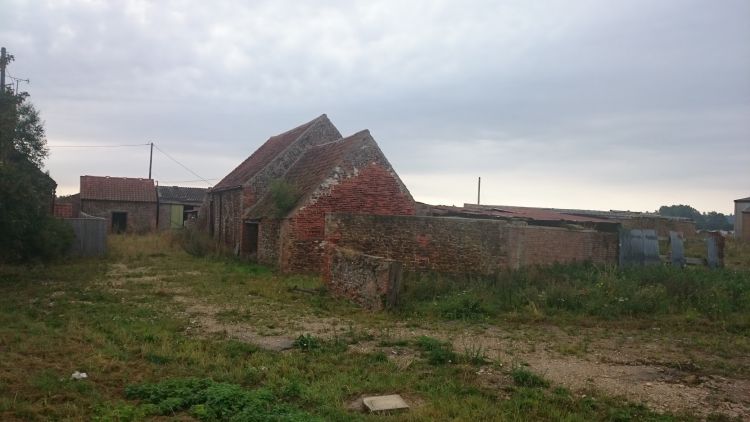
The Old Barn from behind
The site as it was in 2016. As you can see, we had a lot of work to do!
So, I set to work, both on the site and in writing since I had to undertake conveyancing myself due to a lack of funds. I had the buildings and the planning consent to turn them into 3 holiday homes by the beach, something which I thought, at the time, would make a nice retirement project.
The first 12 months of this project were great! As I undertook a full renovation of the site to save it from the miserable state it was in. Building, digging, mowing, tending, and swimming in the sea on breaks. I wanted to transform this bleak eyesore into something that not only looked beautiful but could also serve people looking for a short stay near an amazing beach.
7 years after purchase, the site is now nearly unrecognisable from the state I got it in.
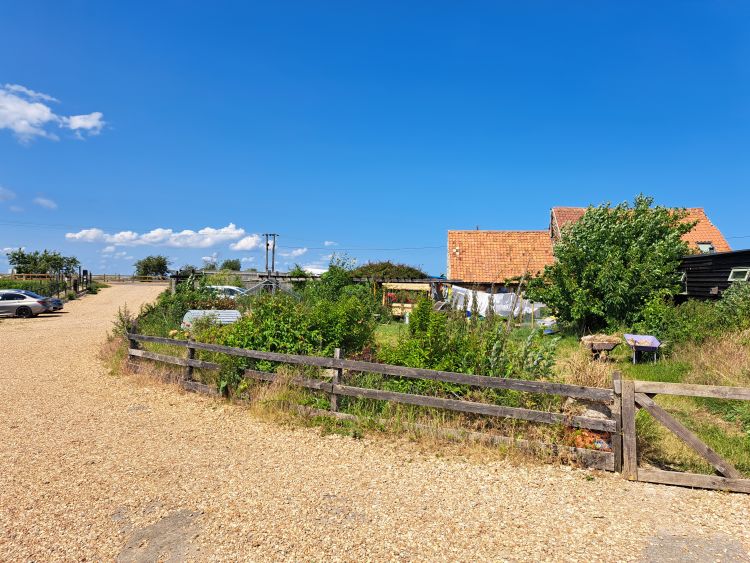
Site Entrance
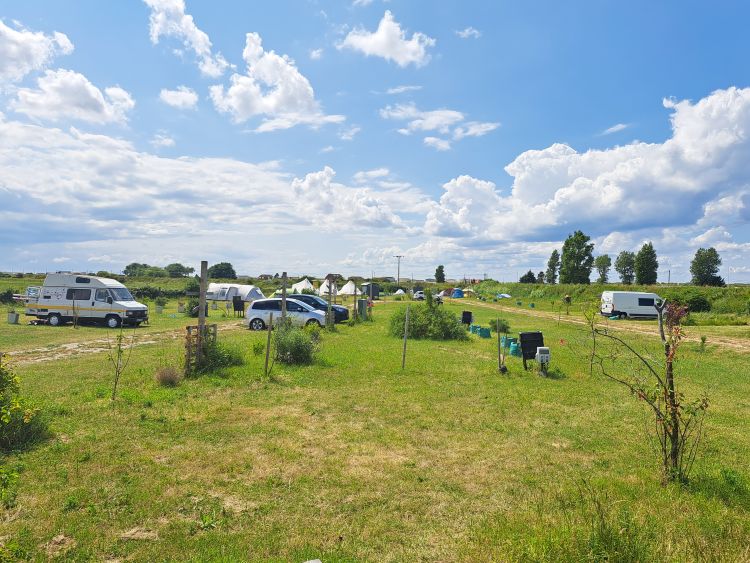
Campsite Field
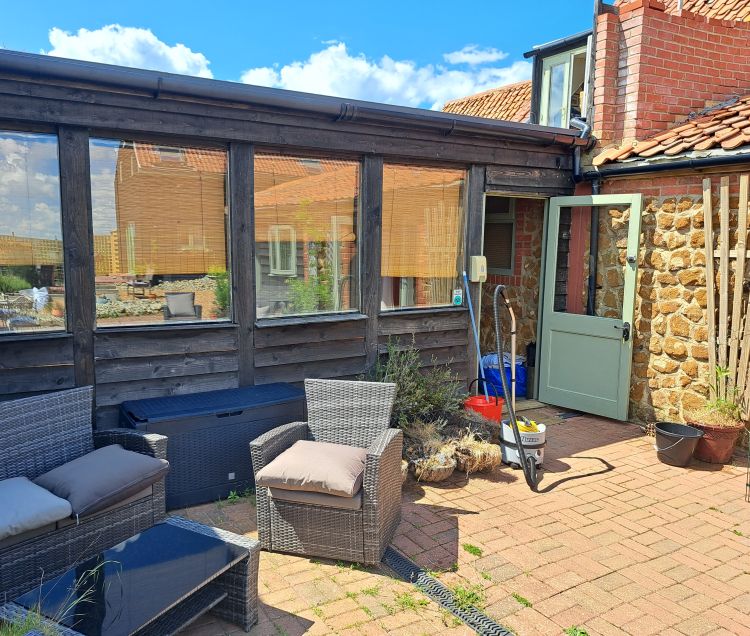
Breakfast Room
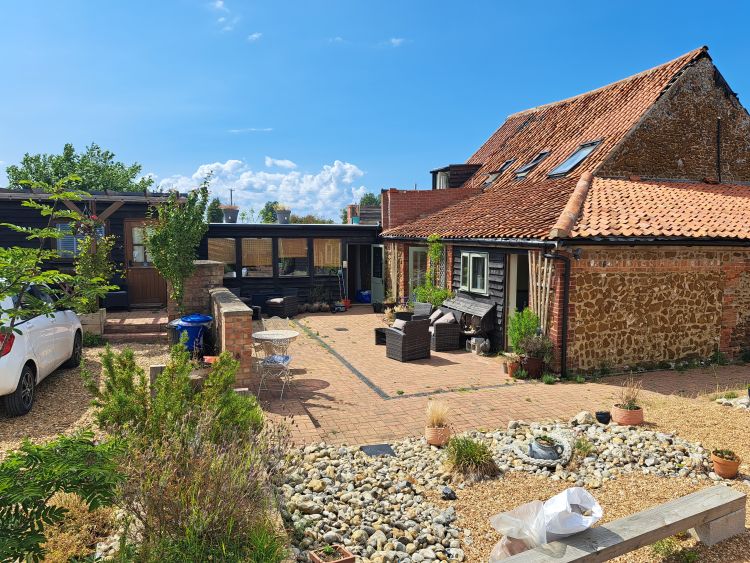
The Old Barn and Breakfast Room
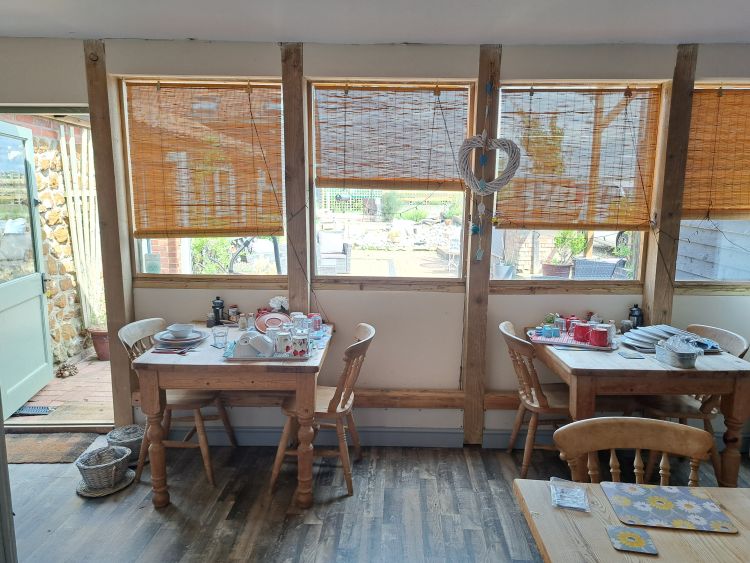
Breakfast Room Interior
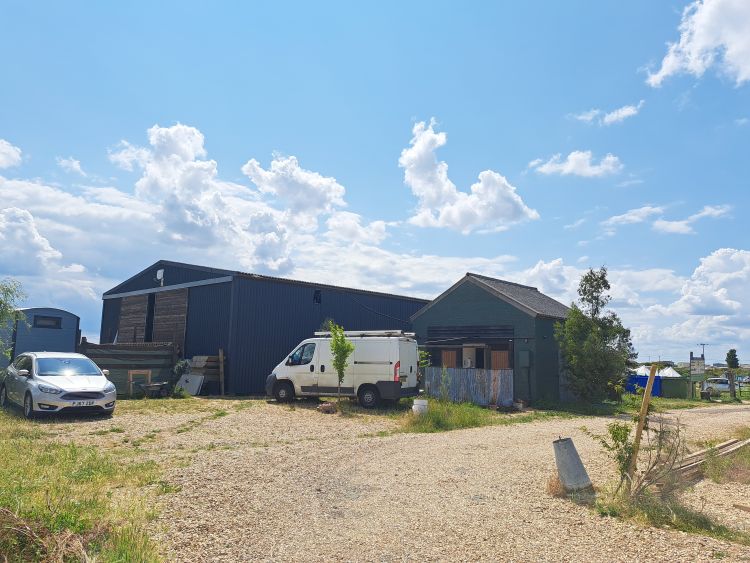
Grainstore and Toilet Block
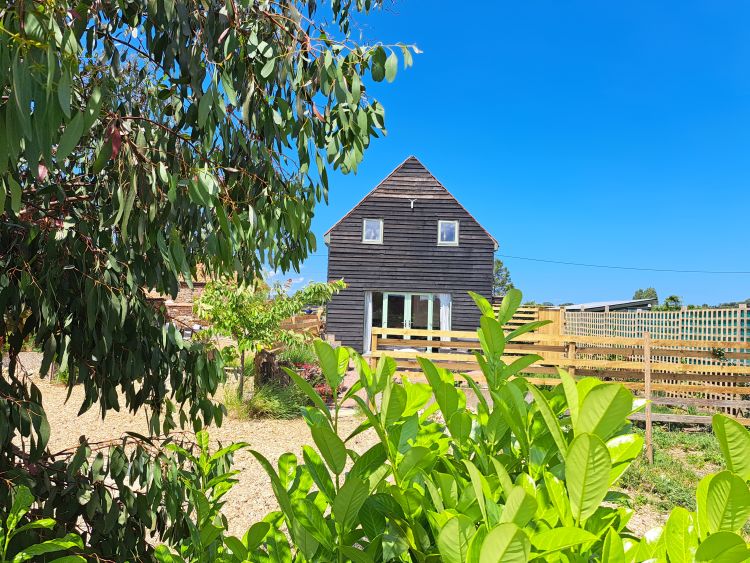
The Dairy
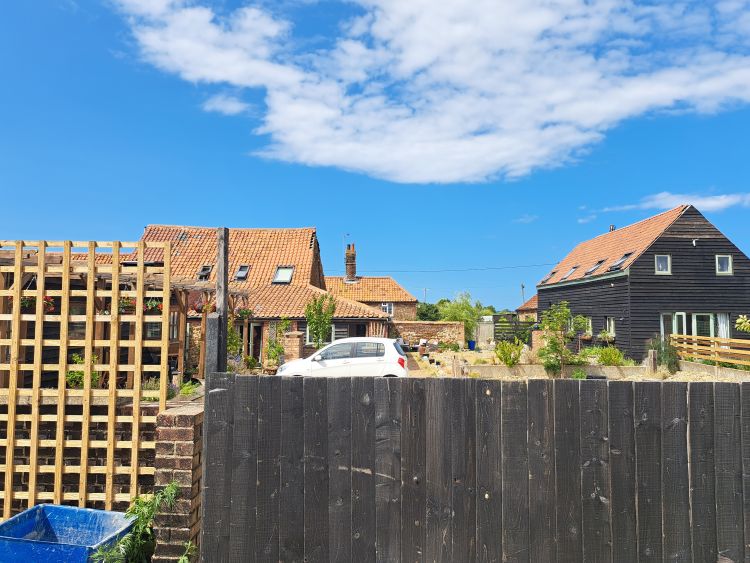
The Old Barn and The Dairy
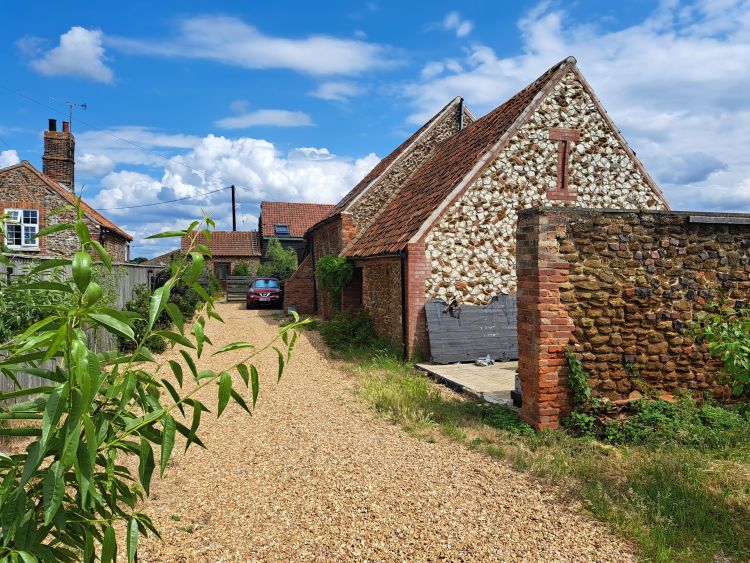
The Old Barn from behind
Of course, the site's history goes back much, much farther, as the original state of the buildings suggests. In fact, the site's history goes back at least as far as the 1930s, when the owner at the time - Thomas Raines - converted his farm into a holiday site for campers and caravans, accommodating for camping trends of the time. He even went as far as to get planning permission for a supply of water to the site in 1935 in order to provide fresh water to the campgoers!
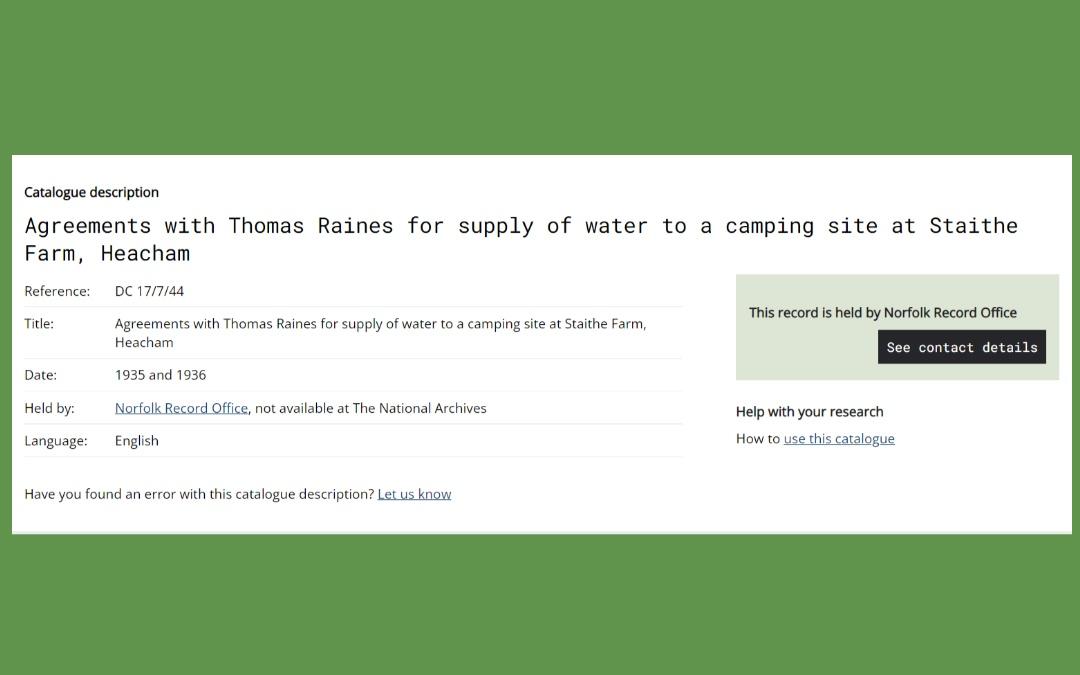
Clearly, Mr Raines saw the beauty of the area and wanted to share it as much as I do!
A couple of decades later, in 1953, aerial photos were taken of the Norfolk coastline to visualise the damage of the North Sea Flood of 1953. Beach Farm appears in these photos in full use as a caravan and campsite, as it is at a high point and therefore makes for a safe retreat from flood waters.
This is a great illustration of the site's rich history as well as its unique natural defences; benefitting from both being at a high point compared to the surrounding areas, and the natural banks that flank the site.
Our site has a long, storied history, stretching back over 90 years. Following its initial time as a camping and caravanning site, the farm went back to agricultural use, with a new grainstore built in 1988 that still stands today. This agricultural use continued until 2013 when the site was sold by Wild Ken Hill.
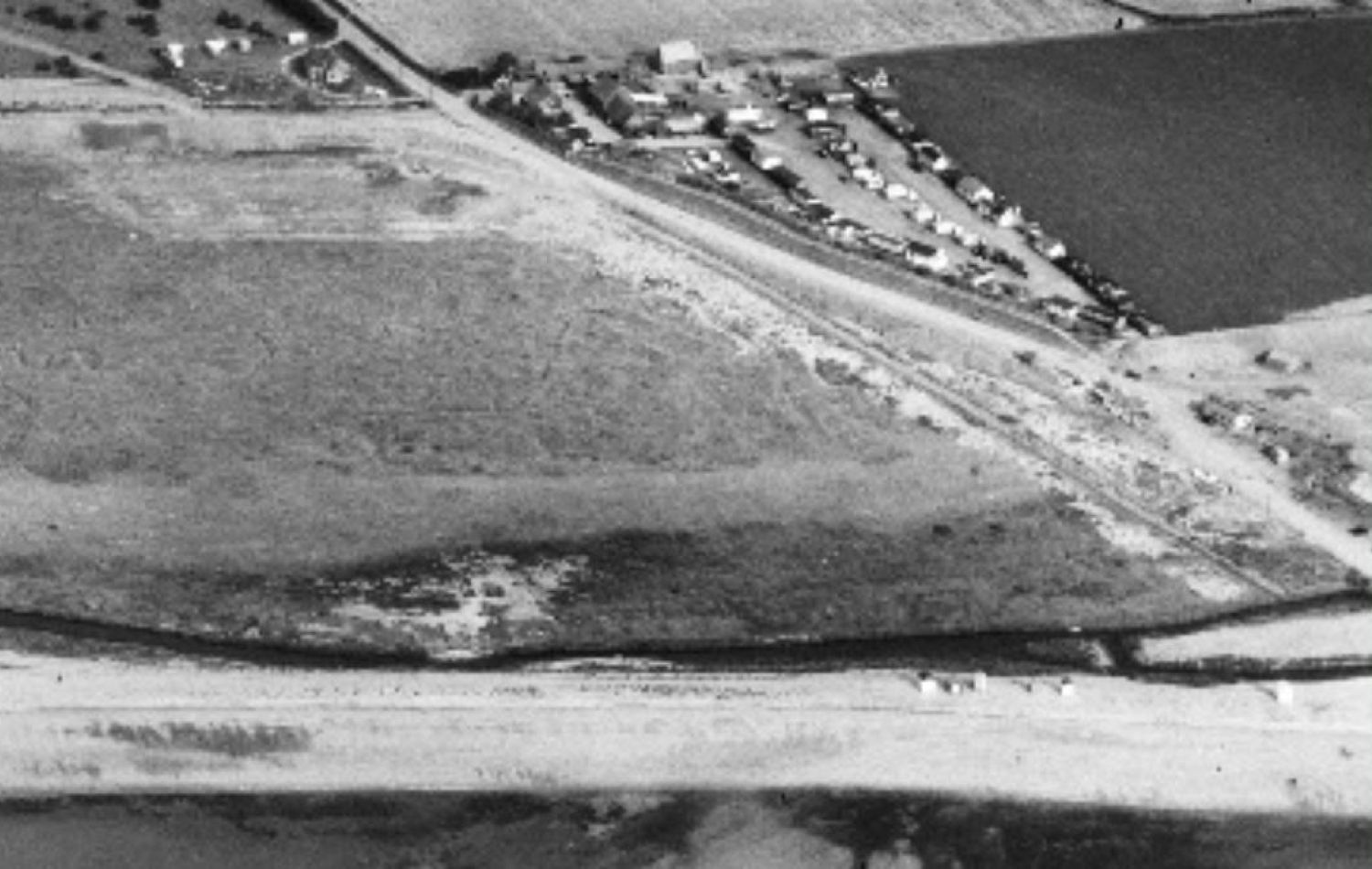
Our site packed with campers and caravans in an aerial photo of the Norfolk coastline in 1953
My plans with the site
Since I purchased the site, my main goal with it has been to share the site, the local area, and the county with others. Norfolk is a gorgeous place, and I have wanted nothing more than to create a venue for people to stay at and explore the area while also keeping the delicate balance of nature in check so the area stays beautiful.
In all of my decisions and plans since 2016, I've stayed conscious of the local area's ecology and done everything I can to avoid encroaching on it. And I'm carrying this ethos forward with other projects, as I'm doing rewilding work on the upcoming campsites that will open around Norfolk. We use eco-friendly products, safe waste-disposal measures (both of solid and liquid waste), and uphold and enforce the countryside and seaside codes to make sure nature remains protected.
In spite of my prudence and conscientiousness in these endeavours, I've hit repeated roadblocks - not from any of the actual work involved, or even in preservation measures, but instead from the council, who have hindered me and this campsite at every step.
Whether it's been in using the site as a caravan and campsite, building a toilet block, converting a disused grainstore into a hotel, or even simply having an entry point to the site; I've followed the law to the letter, applied for appropriate planning applications, gone in-depth into research what I'm allowed to do, and yet still I hit refusals, enforcements, and injunctions that I have to spend time and money on fighting.
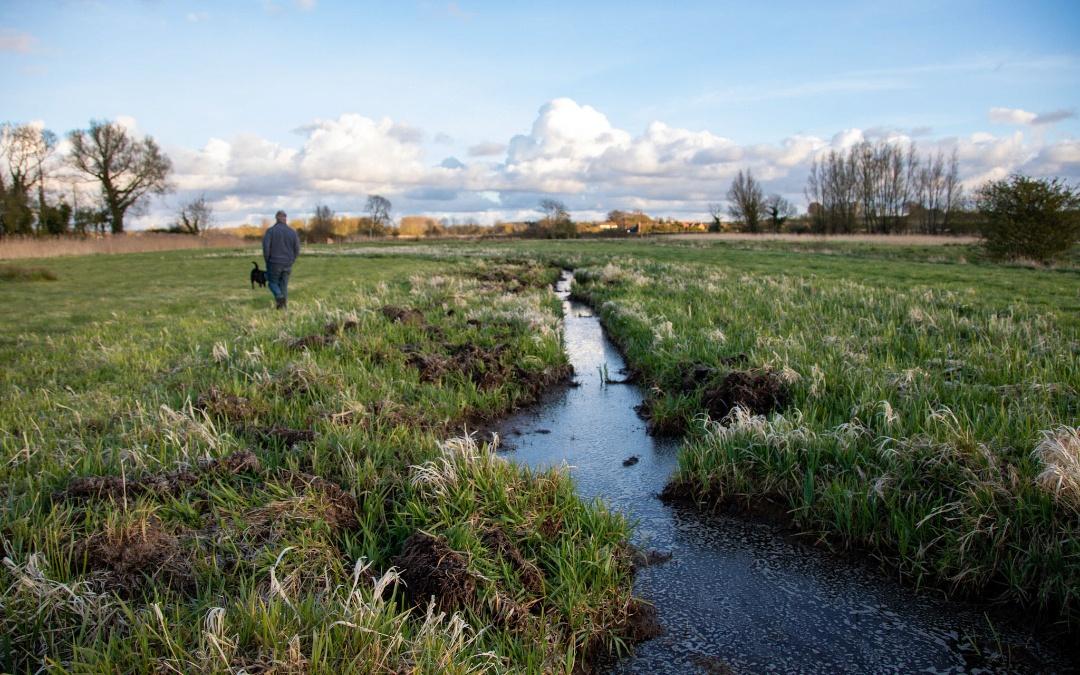
Burnham Norton is a site that I am in the process of rewilding
I understand and appreciate the council's role in making sure development happens legally and doesn't infringe on the local wildlife and residents. However, in my experience, the council hasn't been there to help me make developments legally so much as they have been there to shift goalposts and catch me out in my developments. Across 7 years and multiple projects, I've been left feeling like there's someone making decisions on my projects before even considering the facts, and then scrounging up loose threads that can back up their point so they can reject my lawful applications.
The Three Running Battles
Since 2016, I've been fighting three running battles, each of which are still going on to this day.
Agricultural Buildings - When I bought the site at auction back in 2016, it didn't include the entry point that customers legally need to go through to access the holiday lets, despite having another entry point that customers can enter the property through that I do own. Since then, I've had to deal with planning officers, the highway agency, shifting goalposts, and even some slander in the process of making this other Entry Point legal.
Caravan and Camping Site - I first decided to open up a short-term summer pop-up campsite in 2017 under the then 28-day (now 56 days) permitted development rights for campsites. After the site proved popular with campers in this period, I looked into legally extending its campsite use further. I was, of course, met with enforcements and despite becoming a certificated caravan and camping site, have been enforced against for being a permanent campsite. This is incorrect, but that hasn't stopped the council from serving me with vague enforcements that, I have been advised, are a nullity.
Grainstore - The Grainstore remains the only building on site that hasn't been adapted for tourist use.
Why not?
Because the council says so, that's why not!
This is despite regulations regarding buildings that were in agricultural use in 2012 (which includes the Grainstore) that allow them to legally change usage without prior approval.
Terry Parish and West Norfolk Council slanders local developer
Local developer registers Code of Conduct complaint against Councillor Terry Parish over defamation
Councillor Terry Parish, new West Norfolk Council Head, has had a complaint registered against him by local parish member Nigel Marsh
In a meeting about a planning application on my property, one councillor, Terry Parish, decided to make some choice comments. However, this wasn’t a comment on the application, it was instead an attack on me and my character.
During a planning hearing for a point of entry, Councillor Parish saw fit to slander me and my business, and to this day he has largely gotten away with it!
Councillor Terry Parish’s comments against me had nothing to do with the Planning Application. He objected to the planning application and used slander to manipulate the hearing and convince other councillors to side with him against me! With this, he managed to obtain conditions that the borough council and the highway authority both recommended against.
Condition: build a wall to stop campers from accessing the campsite
One of Councilor Parish’s proposed conditions was to build a wall to stop campers from getting to the campsite, a concept reminiscent of the Cold War and the building of the Iron Curtain!
This condition let me use the entry point, but only for the holiday lets and not the campsite it runs past, making it impossible to operate my business here. It would have required me to build a wall between the entrance and the campsite to prevent access between the two, making certain areas of the site entirely impossible to access!

Tell me where in this picture I could possibly build a wall to stop access to the campsite!?
Condition: The historic entry point can not be used for farming and campsite
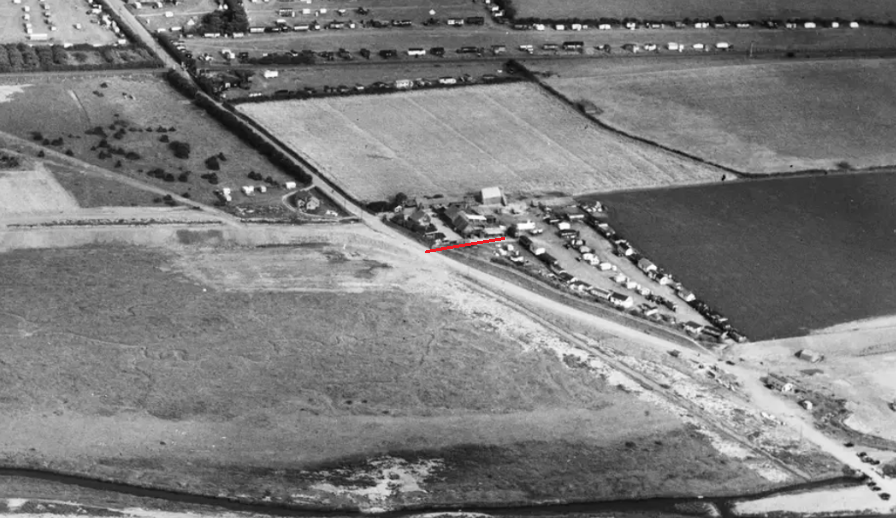
Our site on July 30th, 1953, with the point of entry highlighted
On top of an unreasonable condition to make large areas of my site effectively useless, the council also proposed a condition whereby only holiday let guests could use an entry point! Not only would this condition have been nearly impossible to enforce, but it also entirely ignores the fact that this access point has been accepted since at least 1953 when it was pictured in use as an entrance point for the caravan and campsite which was operating at the time. Regardless of that, the planning hearing still sketched a plan to get it approved!!!!
Councillor Parish manipulates reasons to add conditions
I believe the slander of both my personality and my business influenced the decision-making of the planning process.
The planning process should be objective decisions made to ensure sustainable economic development, a better environment, and improved local infrastructure. Not only is this an attack against me, but it flies in the face of the expected process of council and democracy as a whole!
At this stage, Terry Parish was only a parish councillor, and as a parish councillor or councillor of a borough council there is a code of conduct he should abide by - here are the important highlighted parts relevant to it.
Now, his conduct has wound up making Terry Parish the centre of attention in an article by the Eastern Daily Press; he wasn’t head of the council for long but he certainly caused trouble!
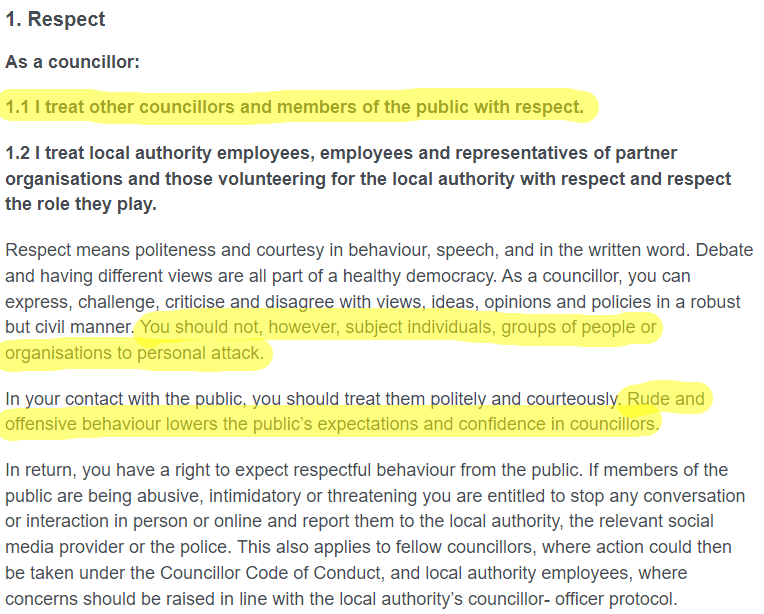
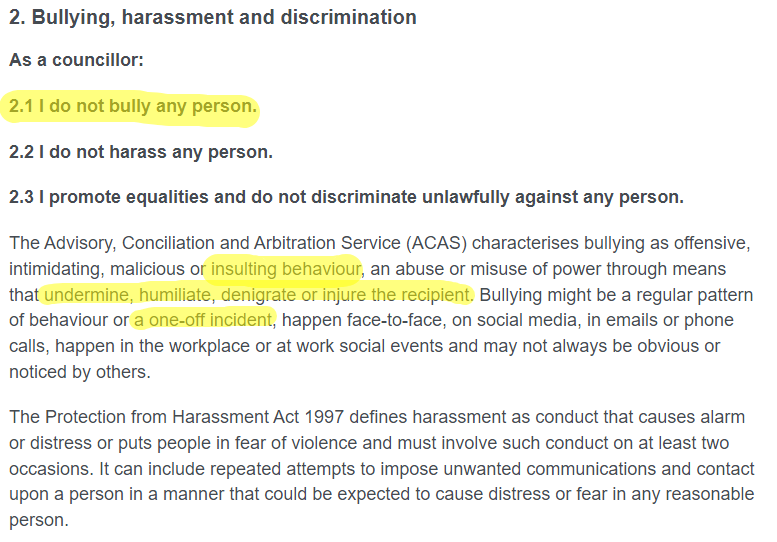
My submission to the monitoring officer of councillors expected me to pull up the councillor, guide them on misgiving, and guide them on how to communicate with the public or, indeed, communicate with anybody. My complaint was clear, I was complaining against slander, libel, unprofessional behaviour, and defamation. The evidence I submitted showed this video with Terry Parish going on to say various things, including:
- Calling me a "rogue developer" that is “causing multiple problems to this and other planning authorities"
- Saying that I’m “known to ignore or abuse planning rules” and that they should find a way to get me to "close the campsite permanently”
- Calling my site a "joke" and an “illegal campsite”
- Saying that the site is “usually full of cars and campervans and God knows what else that shouldn’t be there.”
Watch the video on the right to see the planning meeting and hear councillor Parish's comments, as well as my reaction to them.
With this allegation and this evidence, it is clear to any person on the Clapham Omnibus that I, Nigel Marsh, was quoted by Councillor Terry Parish as a “rogue developer”.
There is no evidence that this is factual, nor is there evidence that this is someone else's opinion that Parish was relaying on behalf of someone else; this can only be his view, and as such it's clear slander. Similarly, the minutes of multiple Council meetings from April 2022 to January 2023 refer to my campsite in a libellous manner as an "illegal campsite"
You can read the email I sent off personally on May 9th to complain about Parish's conduct on the right here.

This is just one of many times my site is unfairly referred to as an "illegal campsite" in Council Minutes.
You can read the full Minutes for April 2022, July 2022, August 2022, December 2022, and January 2023
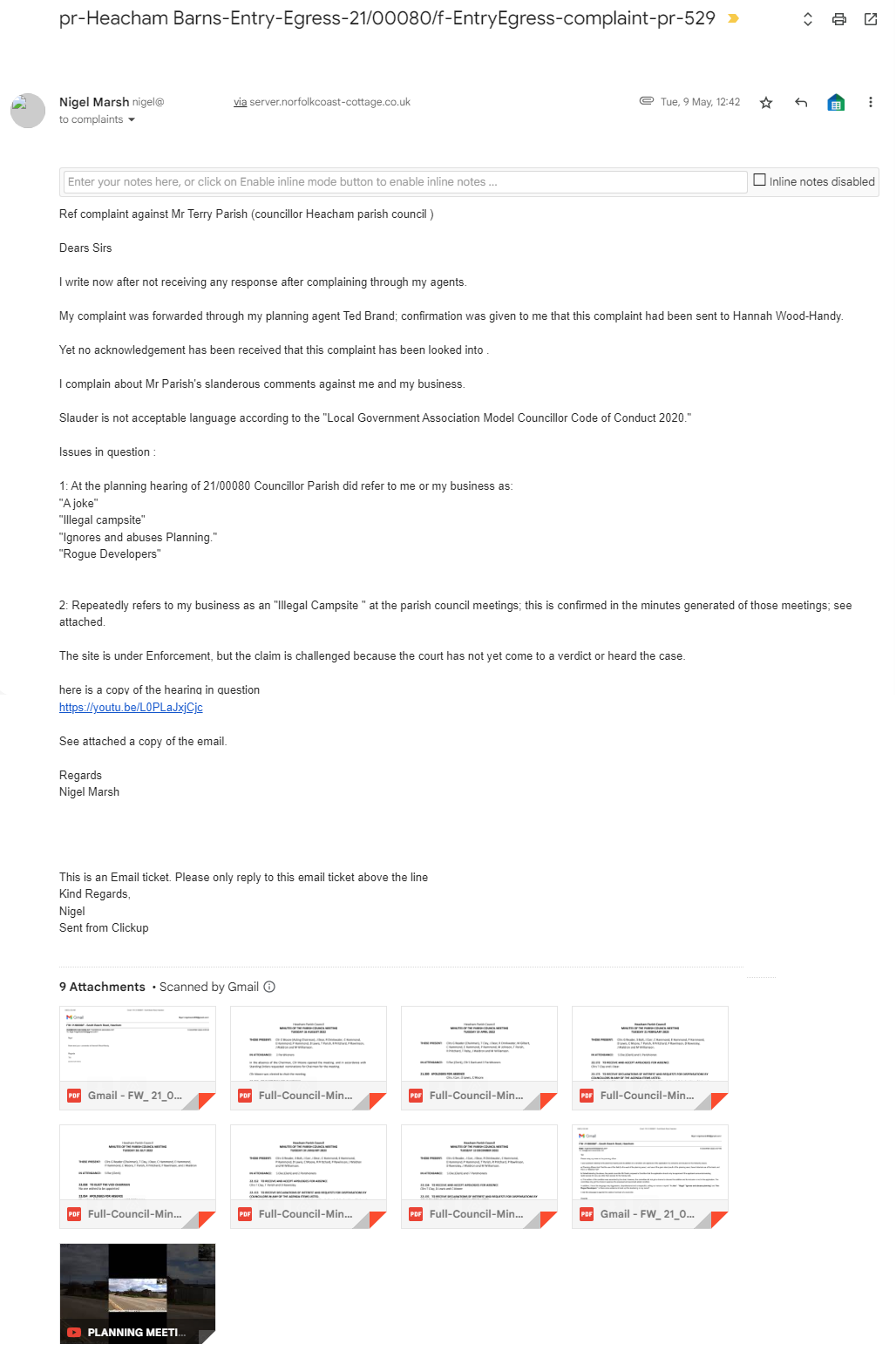
A complaint ignored
Of course, I submitted a complaint on Councillor Parish's misconduct, looking to get him to retract his slanderous statements and get an apology for the defamation of my character in a public meeting where he had no reason nor grounds to attack me and my campsite since neither of these was under discussion. The point of the planning meeting was to discuss an entry point for holiday lets, and Mr Parish turned it into a soapbox on me and my other, unrelated businesses in order to further his own agenda.
You can read the full complaint on the right.
So, how did the council respond to this valid summation of Terry's comments and complaint against the character assassination levied against me by the councillor?
They dismissed it, of course!
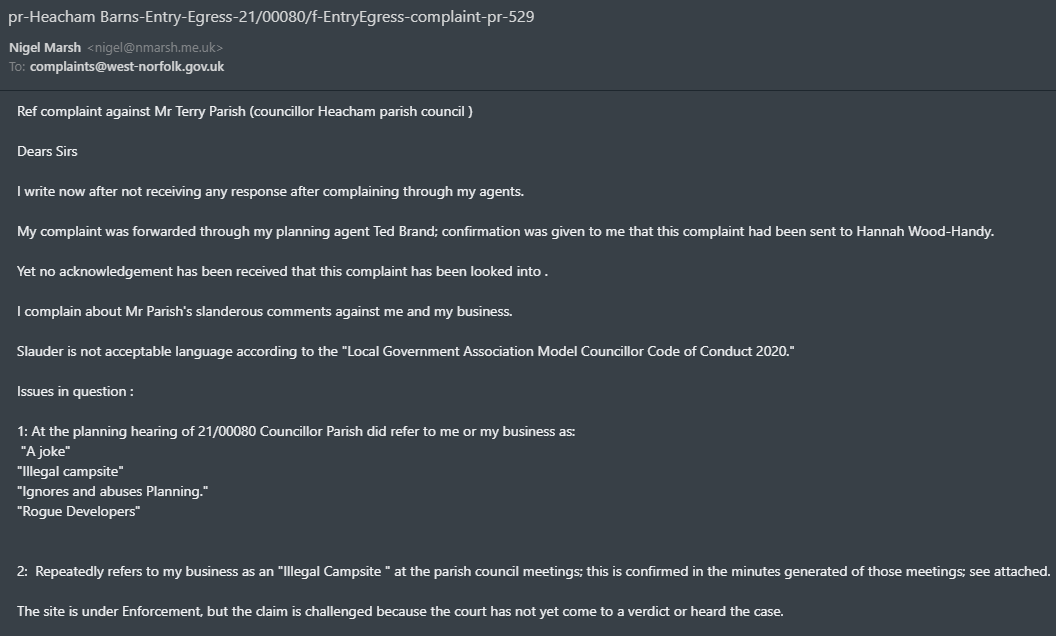
The council looked at my complaint and instead of, again, focusing on the details of my complaint and responding to them, they instead shot off in different directions, justifying why Councillor Parish saw fit to defame me publically instead of perhaps reviewing the language he used and whether he should treat members of the parish like that.
Councillor Parish also uses a number of resolved cases to justify me as a rogue developer. I ask you, how do multiple examples of me fixing things at the request of the council make me a rogue developer?
And then, there's the assessment of the "independent person":
"Whilst the language used is less than perfect, considering the history of Mr Marsh’s noncompliance with regulatory matters, it is of little surprise that individuals at the council have expressed their views in this way – they are only human!"
Yes, they are only human, but they are also councillors! If a cashier snapped and berated you for being unreasonable, would you accept their manager coming along and saying "They are only human"? If someone started kicking off at an officer of the law for an unfair arrest, would they avoid charges because "They are only human"? In a court of law, would someone speaking their mind avoid contempt of court because "They are only human"? Why are the local authorities held to a lower standard of responsibility than the constituents they claim to represent? Aren't they meant to be level-headed officials making objective, reasonable decisions?
At the very least, Councillor Parish needs re-training and to retract his statements. The management officer suggests that if I want to take it further I should appoint a solicitor. However, Councillor Parish represents the council and is the head of the West Norfolk District Council. As such, it's not just a councillor that's gone out of line: this councillor's comments are comments representing the council, and either the council has allowed this language to be used or encourages this language to be used.
As such, I have now complained to the LGA. The LGA, or Local Government Association, are an external monitoring system for local govt to be pulled up when their representatives act outside the code of conduct that they should follow.
Of course, it is entirely possible that Councillor Parish will hide behind "Qualified Privilege", something that allows Councillors to make slanderous statements in the interest of being able to "speak their minds freely" as Lord Denning stated in 1975. But this just leads back to the point: Why are councillors allowed freedoms and protection from defaming others that their constituents don't get?
The Secretary of State’s Planning Inspectorate has scathing review of West Norfolk's planning practice for mYminiBreak.
However, all was not lost. Following a review by the planning inspectorate, these conditions were overturned, and my plans were allowed to go ahead. A report from an Inspector appointed by the Secretary of State laid out their reasoning for this decision, which categorically reflected my arguments and sided with me wholly on the matter.
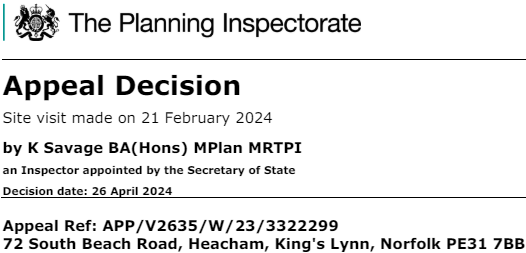
In the report, the Inspector of the Secretary of State writes:

Clearly, the Planning Inspectorate saw as well as I did that there was no legitimate reason to block this access based on this application. But, that wasn’t all, as they later stated:

So, there it is! The Planning Inspectorate appointed by the Secretary of State says that the use of the land is entirely unrelated to the focus of this planning application. I, of course, went to great pains to try and tell the council this, only for it to fall on deaf ears and myself to be branded as a “rogue developer”, a slanderous statement that the council upheld, citing my alleged “noncompliance” as the reason for letting blatant defamation stand in a council setting.
Well, the Planning Inspectorate certainly doesn’t think I’m not complying, and if that’s the case, what grounds do the council have to allow this slander?
You can read The Planning Inspectorate's full report here to see just how supportive they are of like-minded business owners!
With the Planning Inspectorate’s opinion that the council acted inappropriately and confirmation that I acted fully lawfully, I will be submitting a new complaint with a view of putting it in front of the ombudsman if the complaint is ignored, or the council advise that an elected member of the West Norfolk Council representing the council can slander an individual in this manner!
Grainstore restricted from Hotel usage, despite legislation allowing it
The Grainstore
What else would I use a grainstore for?
- 2018 - Holiday Homes
- 2020 - Class R Usage
- 2021 - Toilets & Showers
- 2022 - Residential Usage
- 2023 - Shifting Goalposts
- A Late Decision
- Chasing for a refund
I thought the government wants to encourage agricultural buildings to be used for other uses in particular turned into business residential tourist facilities. I own an agricultural building stuck in the middle of my campsite and holiday site. It’s no longer viable to keep a herd of cattle. I don't need a shed of chicken feed, and I haven't got a tractor, so why not utilise the 2015 general permitted development order act which gives permitted development for such a building to be changed and utilised for several uses under Class R?
As I understand it, and as I've been advised of it, under 150 square metres change of use can be done without anybody's consent, if I got an agricultural building and want to put a shop in there, then so long as it's under 150 sq/m I can do so without having to go through forms, applications, consent, or any other bureaucracy before implementation. If it's over 150 sq/m but under 500 sq/m, I need to go to the local authorities for their consent or approval where they have 56 days to yay or nay.
Conditions of approval have nothing to do with what the local parish council or local documents say, we just need to tick the boxes of The General Permitted Development Order Act of 2015 with these conditions:
- transport and highways impacts of the development are mitigated;
- noise impacts of the development are mitigated;
- There are no contamination risks on the site; and
- There are no flooding risks on the site,
If these boxes are ticked, the council HAVE TO approve. For it NOT to be approved would be unlawful, and the council would be acting unlawfully, unreasonably, and restricting my legal rights of using my building as per the law allows.
Now I ask, would the council act unlawfully?
And I answer: too right they would.
Because they have.
Do I have evidence of this?
Yes, I do.
Who can be held responsible? It seems nobody. It seems that, regardless of whether there is a rogue planning officer or a rogue controlling influencer telling planning officers what decisions they should make, none of these can be held responsible. Our only option is to spend more money on appeals to argue our point and get the decision we're lawfully entitled to. And yet, none of these individuals are held responsible for their errors! Surely it can't be an error if done intentionally, either they're appallingly ill-informed or they are manipulating lawful rights with the aim of creating confusion to justify an unlawful decision.

The grainstore and toilet block in 2016: old, dilapidated, and not in use

The grainstore and toilet block as they stand today. They look much better, don't they?
2018 - Application for Holiday Homes
Once I had purchased the site and its buildings in 2016, I then made the decision to run a tourist destination considering its prime location and prior agricultural use. I first started looking into how to convert the Grainstore into a building for holiday home usage.
I submitted an application in 2018 for a proposed change of use to existing agricultural buildings to holiday home use at Beach Farm on Beach Road in Heacham. However, this application didn't go far as, at the time, I was inexperienced and not as knowledgeable as I am now regarding my options in change of use. Combine this with a cavalcade of more pressing legal matters and not knowing how to move forward with the idea, I decided to withdraw the application and focus my efforts elsewhere.

This draft application from 2016 shows how early I wanted to adapt the Grainstore
2020 - Application for Class R use
By this point, I had become quite knowledgeable about the General Permitted Development Order Act of 2015, and so submitted for prior approval for the Grainstore to be used as a dwelling house under Class R. The submission for this kept to an area over 40 sq/m and under 150 sq/m that was used for Agricultural use 10 years prior. According to the fourth edition of Martin Goodall's A Practical Guide to Permitted Change of Use, this makes it eligible to be changed to Class R usage which, among other things, includes Hotels.
So, I submitted the application, believing that the Grainstore more than fit the requirements of Class R usage.
The application was refused on 3 points.
1. The use of the building does not comply with Class Q.1 (a) Part 3 of Schedule 2 of the Town and Country Planning (General Permitted Development) Order 2015 (as amended) insofar as the site is not used solely for an agricultural use as part of an established agricultural unit.
2. Insufficient information has been provided to demonstrate that the works to achieve the conversion satisfy the requirements of Class Q.1 (i) Part 3 of Schedule 2 of the Town and Country Planning (General Permitted Development) Order 2015 (as amended) in regard to structural changes
3. Insufficient information has been provided to determine whether, as a result of the proposed change of use, taking into account any proposed mitigation, the site will be contaminated land as described in Part 2A of the Environmental Protection Act 1990(9), and in doing so have regard to the Contaminated Land Statutory Guidance issued by the Secretary of State for the Environment, Food and Rural Affairs in April 2012(10). This does not meet the procedural requirements of W(10)(c) of Class Q, Part 3 of Schedule 2 of the Town and Country Planning (General Permitted Development) Order 2015 (as amended).
2021 - Toilets & Showers
Based on the findings of the 2020 prior approval application and subsequent refusal, I looked to use 40 sq/m of the Grainstore as toilets and showers for my lawful caravan and camping site. I submitted an application to the council for their acknowledgement and approval, knowing my usage was 100% lawful under The General Permitted Development Order Act of 2015 - by utilising 40 sq/m of the Grainstore for leisure.
The leisure use was showering and toileting facilities after a day at the beach. In the planning officer's report after the decision, Chris Fry (Planning Officer) quite rightly asked the council’s internal legal department for the rights to the legal use of this building as described. The internal legal department replied to Mr Fry that the usage as described IS lawful and as long as the Grainstore in question was used for agricultural use in 2012, it doesn't matter what the building was used for between 2012 to 2021 - the use as described in the application would be lawful use:
"For the purposes of the GPDO I do not believe that it matters whether the use of any adjoining planning units is lawful or not. The principal determining issue is whether the building was used solely for an agricultural use as part of an established agricultural unit on 3 July 2012. If so, then its use can change in accordance with the Class R criteria."
Despite this advice, Mr Fry entered into a decision on the application as refused, alleging its connection with an enforcement order of 2019 regarding a permanent campsite restricted this application for approval. This is despite any context or explanation in detail as to this alleged connection.

The legal opinion is that the priority of this application is whether the building was in agricultural use in 2012 - an opinion haughtily ignored by Mr. Fry
2022 - Entire Grainstore for Residential Usage
Following this refusal, I further applied on 4 different occasions regarding the change of the entire Grainstore to Residential use. Since it is over 150 sq/m but under 500 sq/m, I did need to apply for planning permission, but it is still permitted under Class R. I've obtained items back for rejection and admittedly need to do more research, since these refusal letters often need a spyglass and fine tooth comb to understand what the council thinks you did wrong.
Throughout the discussions on these applications, I have:
- Supplied a contamination report to show there's no contamination on site
- Supplied a Habitat Regulation Assessment and Shadow Habitat Regulation Assessment that was amended based on Natural England's required updates
- Requested a permit for a septic tank system as per Natural England's request
- Undertaken an ecology report to ensure there are no endangered habitats on-site
- Made a payment to the GIRAMS to mitigate any potential damage to wildlife
2023 - Contesting 2022 Refusal and Shifting Goalposts
The final application 2023 settled without any doubt the fact that we are in a flood risk 1 zone, not in a 2 or 3 zone. The Environment Agency updated their info based on the topographical evidence I supplied and confirmed that we are not in a flood risk zone. In fact, they changed their modelling and showed that we are not in a high-risk overtopping site.
This time after lots of confusion and email back and forth, the refusal arrived to state that because the Grainstore was used for something other than agricultural use in 2021, I now need to wait a further 10 years before reapplying. This is now completely contradictory to the legislation documented in the General Permitted Development Order Act of 2015 and entirely in opposition to Chris Fry's statement seen in the image to the right as well as the legal advice shown in this image.
Now, of course, back in 2021 we removed the toilets as they were refused to be used in conjunction with the Grainstore. However, they're now saying that the Grainstore wasn't a Grainstore in 2021. So, I ask, what on earth is it, then? If you put a disabled toilet into a train station, does the entire station become a toilet that trains pass through? Does putting toilet stalls in a restaurant make it one giant bathroom that serves food? How is the council allowed to call things on my site different things to achieve their goals?
The reason ignored in their decision is such a basic cornerstone of the agricultural building pre-approval scheme that the average schoolboy with an interest in structural planning is aware of the condition that if a building was in agricultural use in 2012, its usage can be transferred to any number of uses under Class R.

According to Mr Fry's report, the Grainstore is permitted by Class R and complies with all the relevant points.
This leads me to believe one of three things.
- Either planning officers are woefully ill-informed and untrained;
- the council is so understaffed because they've failed every recruitment drive that they have had to resort to getting work experience from the local primary school; or
- a decision is made from above (The Muppet Master) to refuse, leaving the so-called planning officer to dream up the reasons that allow for the decision to be made public.
Is this any way for local government to operate?
Their priority should be in serving their community, both business and consumers. The tourist industry is an important one for Norfolk and one that needs development. Of course, it should be developed carefully to ensure the delicate balance of beauty in nature is undisturbed.
But commerce, creating jobs, and contributions to local taxation are important needs that tourism provides and we could provide far more effectively if we weren’t hindered at every half-step. In fact, it would all progress far more smoothly if the council actually helped us understand what we need to do and how to do it instead of leaving us to stab in the dark until we get it wrong.
As far as the planning legislation dictates, every planning app should be looked at positively from an unbiased viewpoint.
"Holders of public office must act and take decisions impartially, fairly and on merit, using the best evidence and without discrimination or bias"
“Planning issues must be assessed fairly and on their planning merits, even when there is a predisposition in favour of one side of the argument or the other. Avoiding predetermination and the impression of it is essential. The decision making process must be seen to be fair and impartial from the perspective of an external observer.”- Probity in Planning, December 2019
A late decision
Of course, there's more to the refusal than the foolish decision above.
See, this application for a change to Class R use was received on the 22nd of March 2023. The refusal came on the 8th of June.
Under the 2015 General Permitted Development Order Act, authorities must notify an applicant of their decision within 56 days of receiving the application. Given the timescale laid out above, the council didn't respond for 78 days, far beyond the permitted time zone of 56 days, which effectively defaults the application and gives me development permission.
Moreover, the council charged me more than double what they should have for an application for Class R usage. The standard fee for this application is £96, however after I handed the application in, I was told I needed to pay an extra £110 on March 27th. I wasn't told why I had to pay this extra at the time, and it doesn't change the fact that I submitted the application and paid the correct fee on the 22nd of March. In later research, I learned that a fee of £206 is when building operations are proposed alongside change of use, however I didn't propose any building operations, so this was an error on the authority's part.
And, thanks to all the council's errors, I see no reason that I cannot start development, and as such will be starting work on it now.
Of course, in the interest of being fair and lawful, I have still submitted an appeal for this condition. You can read the full appeal and appendices to the side, as well as a Shadow Habitat Regulation report carried out in May of this year to show the mitigated impact on the local ecology below:
Chasing for a refund
So, the season of 2023 passed; the busy summer period where tourists are looking for places to stay and I try to provide a good one. Once it did, I could re-focus and look into chasing the refund for the money the council requested for no reason. I applied for a refund for the £110 that was wrongfully charged for "operational development", looking back through documents to support my case that I didn't apply for any extra development work that would incur the extra expenses I was charged of. refusal
And in going through the documents, I found the initial refusal, and in it found something very interesting:
Prior Approval is sought for the change of use from an agricultural building to a hotel.
No operational development is permitted by such an approval.
This begs a very pertinent question: if operational development isn't permitted by this prior approval, why was I charged for it? Both the council and I know that operational development is not permitted by a change of use to a hotel, so why would they expect an extra charge that wasn't applied for and wouldn't be allowed anyway?
This only further damns the council, not just in me being entitled to a refund, but also in their late reply, 78 days after I paid the correct amount. Their defence is that the application didn't really start until I paid the full amount, but if I didn't apply for operational development, and operational development isn't permitted regardless, why did they expect me to pay this amount in the first place?

You'd think the council wouldn't want to give themselves more work, but I suppose putting Mr Marsh's plans on hold is simply too important to them!
No legal point of entry to site allowed by council
No Entry Point for Holiday Lets
Agricultural Buildings - Planning Approval
- Auction & Conveyancing
- Enforcement
- New Planning Application
- Addition: New Point of Entry
- Appeal for Point of Entry/Exit
- Request of & Appeal for Minor Amendment
I’m very commercially minded and can act very impulsively on what I perceive as an economic good deal. I am eager to jump in with both feet, embracing the challenge of learning new skills and making nothing into something that I perceive is achievable.
Auction & Conveyancing
In 2016, an old dilapidated farm building came on the market to be auctioned off to the highest bidder. Of course, I advised my wife fully of my plans (not), and I made my excuses to pop into the neighbouring market town to purchase some wallpaper. In truth, my intentions were to go to the auction and bid for a property I had no finances for and couldn’t afford. To my surprise - subject to a £10,000 deposit - I successfully won the bid.
Money was tight, so I undertook conveyancing myself. I had no option to change any details in the auction and had already committed myself to the deal - I had to have as it stands, there was no room for negotiation, it is as it is when the hammer falls.
It was a great 12 months, rolling up my sleeves, taking part in building work, digging work, living in a caravan, taking a dip in the sea when work became too exhausting. However, this was a short-lived holiday. The real work began when the final touches of development started to take place, ready for the first guests.
Click the images to see the full versions
Enforcement
One sunny Thursday morning, an enforcement officer turns up and advises me cautiously that it's unlawful for me to operate my new holiday lets, as a condition of them is the customers must enter holiday lets via Entry Point A.
As Entry Point A wasn’t sold to me at auction, it would be unlawful for the holiday lets to operate as it would be unlawful for my customers to invade someone else’s property to access. Despite saying I have Entry Point B where people can enter the property, the planning consent says customers must enter through Entry Point A.
This was a bad day.
This was also bad information and something which I didn’t quite know at this stage how to get around.
The visit was followed by an email confirming the discussion, and 3-4 months later I received an enforcement notification advising I was in breach of certain conditions of planning consent. Despite the enforcement notice advising I should cease all operations, I did continue development as I believed this could all be worked around, so long as all parties worked together to resolve it.
To my surprise, all parties were not interested in working together to resolve it.

Entry Access Point B to our site

The enforcement notice I received from the council.
Click the image to see the full notice.
New Planning Application
After talking to many different people regarding the situation, it seemed to me the easiest solution with my minimal cash flow was that I should reapply for new planning consent. This planning application was, largely speaking, based on the previous approval in 2012, with the exception of using Point B as an entry point instead of Point A. I was aware there were some minor changes to be made to Point B:
One arrangement was with the Environment Agency to change their flood risk sign so it didn't cause a visibility hazard when exiting the property;
The other was convincing our neighbour to move their fence back to the boundary line at the end of the grass line instead of on the highway.
We achieved both of these and my appeal for a new planning application was submitted… at the cost of roughly £2500 plus consultancy fees.
Unfortunately, this application was refused due to new policies which now cover the area. No exception was made by local planning officers given that this was an application to solve an existing problem rather than an application for a new development. This was still the same application as the 2012 one that got approval.
Trying to get advice from planning officers was difficult; the reasons for the refusal seemed illogical and there was no mechanism to add another point of entry to the original application. It was less a case of the officials helping me to run a lawful hotel or holiday home, and more one of me clawing in the dark until I either did it right or hit another enforcement notice.
Looking back, if they approved the application, I would have also been responsible for the Community Infrastructure Levy (CIL) which would have cost me roughly an extra £30,000 on top of the £2,500 I had already paid. The planning officer maybe should’ve considered this easy boost in funding, given the fact that approving the application would have brought an extra thirty grand into the local authorities' purse for additional infrastructure. Something that I think the local parishes and county councils should consider more, as additional infrastructure is important for communities, especially the local ones that are lacking so much in services and facilities.

The CIL goes towards the improvement and upkeep of infrastructure. This includes schools, roads (which includes potholes), mobile communications, and much, much more.

This report from 2012 proves that the site and its buildings were in agricultural use in 2012
Also looking back, I now know that as the agricultural building was in agricultural use in 2012 and I can’t help questioning myself as to why I submitted a new planning app for £2500.
For £250, I could’ve submitted a pre-approval and obtained it through permitted development (subject to solving the flood risk factor).
I found the local authorities wholly unhelpful in resolving the situation or even letting me know what it was they wanted to be done. Because of this was facing the prospect of demolishing the substantial development I’d already finished; returning the holiday homes to dilapidated barns or cowsheds as progression seemed unachievable.
Addition: New Point of Entry/Exit
After many months spent in limbo, looking for a way forward, I eventually hit a realisation and frustratingly don’t understand why I didn’t realise this earlier: I could actually apply to Planning Consent for a new entry point, specifically for a holiday let and then Planning Consent could quote that this entry is for a holiday let. With the planning consent being granted for that particular use, I could apply for the condition to be removed as the condition is no longer relevant since permission has already been given for particular access. This was my theory, and my studies seemed to confirm that this was practical and possible as there were not many planning policies that need to be honoured/agreed to in a simple track for vehicles to enter over, park on and turn around in.
In 2021, I submitted the application.
18 months, 5 different planning officers, and 1 planning hearing later, I finally got my approval.
But, of course, they didn’t approve it before first adding an extra condition that this driveway could only be used for my holiday lets.
Despite the planning officer saying this couldn’t be enforceable, they eventually gave way to limit the access point by adding a condition that this driveway could only be used by residents of the holiday lets.
While at the hearing, I felt that the local parish councillor, Terry Parish, didn’t act like a public servant at all. He saw fit to slander my name, quoting that I run an “illegal campsite”, I’m a “rogue developer”, my site is a "joke", and that I am “known to ignore or abuse planning rules”. These are untrue, slanderous comments with the intention of damaging my reputation and the reputation of my business in the eyes of the council. See my comments on the council meeting here:
I, of course, entered into complaints procedures regarding his conduct. As a parish councillor, it’s his job to act on behalf of both customers and businesses, and he should hear my point of view as well as the residents' point of view. Even in this case where the council was in agreement with the development and there were no public objections to the development.
And how did the council respond to this complaint?
They dismissed it out of hand, saying that "Whilst the language used is less than perfect", "it is of little surprise that individuals at the council have expressed their views in this way – they are only human!"
Now, as a campsite owner, I have to watch what I say intently while interacting with guests, much like a cashier, waiter, or any other customer service worker. If, when faced with a particularly tough customer, I resorted to language like that used against me by Councillor Parish I would, at best, get a poor review that has the chance to damage the business and at worst, get a complaint sent straight to the council. If a customer service worker did the same, they would get reprimanded or even fired for their misconduct.
So I ask, why are Customer Service staff, minimum wage workers who assist the public, and anyone else who interfaces with people in any capacity held to a higher standard than the Councillors who are meant to have the public's best interests at heart?
The Local Government Association's Councillor's Code of Conduct 2020 outlines how a Councillor ought to act. Calling me a "rogue developer" and a "joke" is clearly a lack of respect in breach of point 1.1, and all the comments are attempts to undermine and humiliate me, which is a breach of point 2.
Appeal for Point of Entry/Exit
So, I finally received the approval with the relevant conditions, however now have to appeal the condition that it can only be used for the Holiday Lets.
The development was a retrospective application, which means the road gate with the correct access width was already in place and all development had already been undertaken. With the appeal, Norfolk Highways put in a condition for a standard width to be implemented, high visibility splays at the exit, water on the cars disposed of before hitting the highway, and other standards. They gave us 3 months to complete this work. After 3 months, to my surprise, an enforcement officer was back on my doorstep to enforce against conditions of Norfolk Highways not being completed.
They seemed to believe the entrance was not at least 5 metres wide as confirmed as a condition, and as such are chasing us regarding a failure to undertake work on it.
The thing is, it’s over 6 metres wide.
That’s the first order of the conditions but there was no work to undertake as we were already compliant. It was a retrospective application as the work was already done before submitting the application. The enforcement officer failed to explain what it is I failed to do and progressed to enforce against me. By enforcing against me, they potentially stand to make this access unusable and therefore my holiday lets unlawful. I have, of course, appealed against this. See images for full details of the appeal.
-
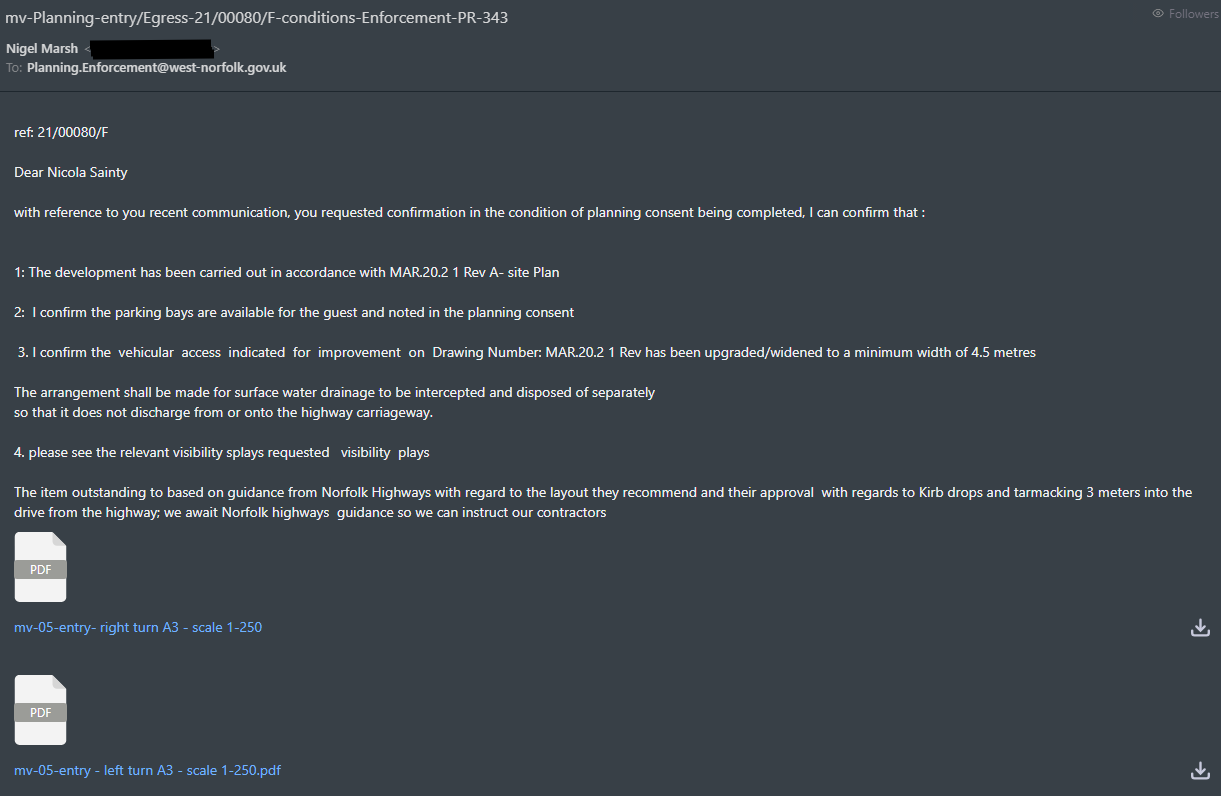
Email 1
-

mv-05-entry - left turn A3 - scale 1-250
-

mv-05-entry - left turn A3 - scale 1-250
-
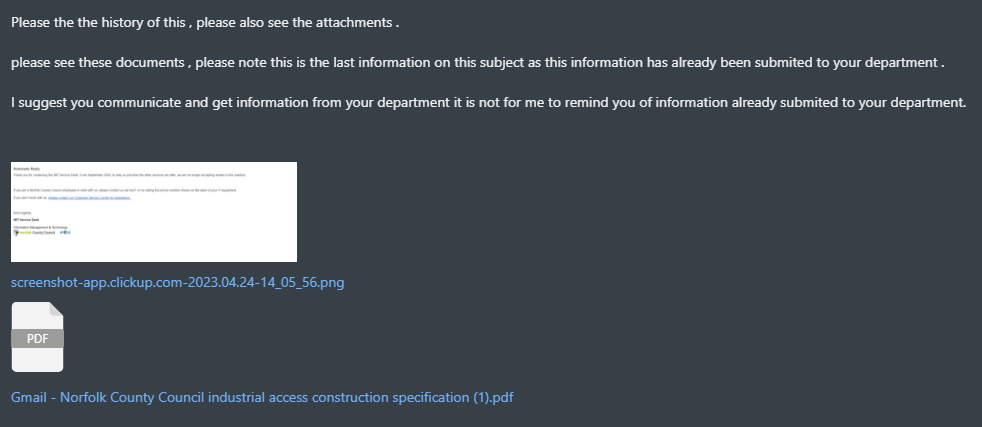
Email 2
-

Govt Receipt of Liaison
-

Gmail - Norfolk County Council industrial access construction specification
-
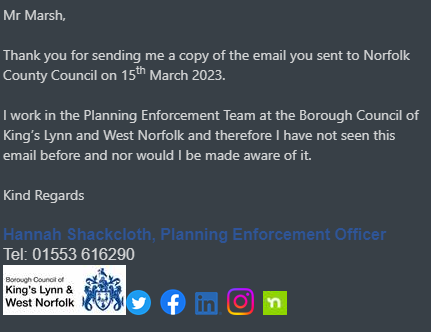
Email 3
-
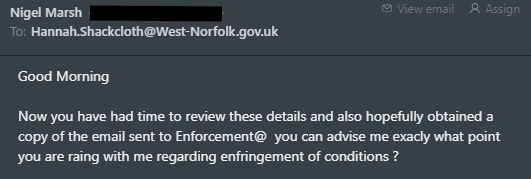
Email 4
Request of & Appeal for Minor Amendment
Meanwhile, under another enforcement, the officers come and inspect the final Holiday Let I completed and state that the windows and doors aren’t as expected or say on plans. As such, I need to change them and apply for a planning application on that change. At this point, thanks to the barrage of planning applications I’ve had to fill out, I’m becoming quite knowledgeable and know that the full planning process isn’t needed, I just need a minor amendment to the original plan. The minor amendment needed to show the windows and doors in a slightly different location. I just needed to apply under a minor amendment, and so I did.
For some reason, the LPA then decided not to evaluate the minor amendment but instead evaluated the application as a new residential use with the potential for having more guests than the planning consent allowed for. This, unsurprisingly, left me completely dumbstruck; you ask the local planning authorities to judge on one issue and instead of that, they decide to judge on a different question you haven’t raised, wasn’t expected or asked to raise, and as such wasn’t in the application form and you haven’t submitted details on. That's like if I entered my young female labrador Bramble into Crufts and find out she was rejected because they judged her on being a Bulldog!
This cannot be right.

Bramble is a good girl, but it'd be unfair to judge her as anything other than a Labrador!
As a result of bringing in an entirely separate and heretofore unmentioned issue, they refused the application and as such I, once again, had to appeal the application. See appeal overview here:
